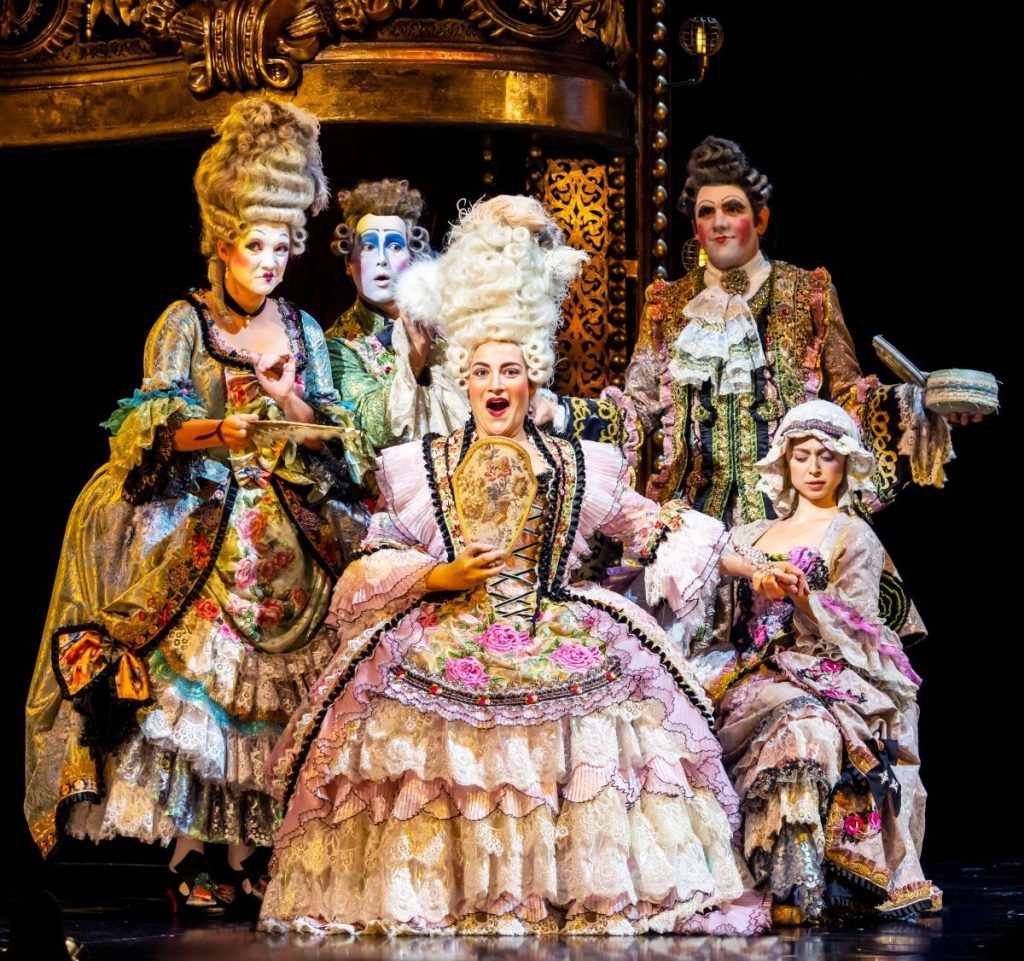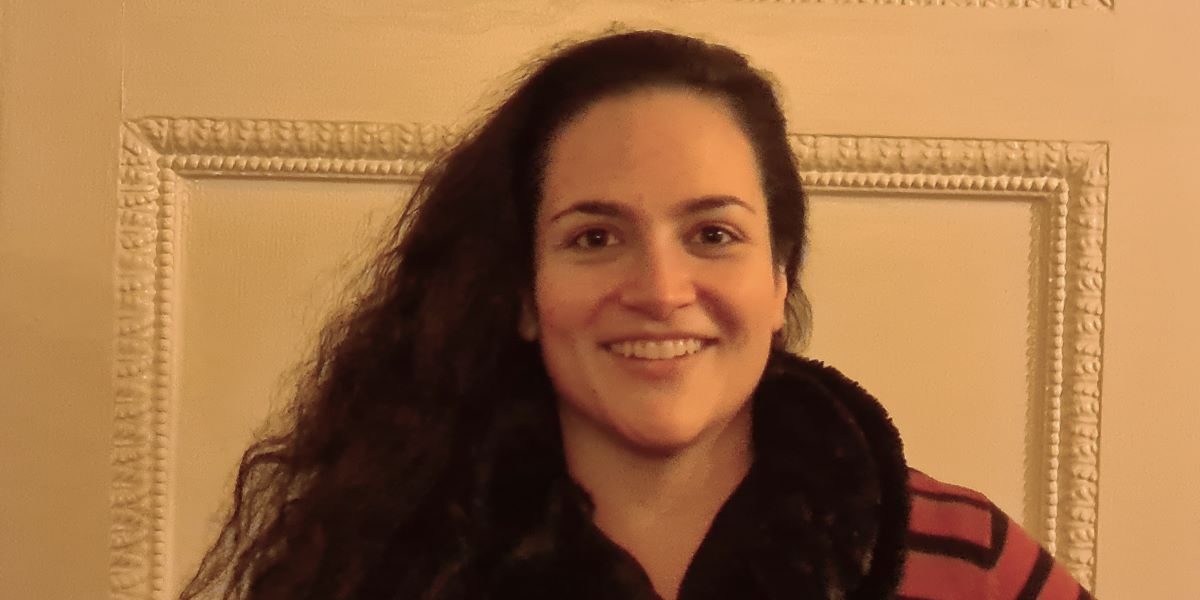The Phantom of the Opera celebrates 36 years of performances that have only been interrupted by the coronavirus pandemic
On the 1st of August 2022, at the tail-end of Covid-19, Kelly Glyptis, a lyric soprano, steps into the role of Carlotta.
Carlotta is a soprano who is ousted through dirty tricks inflicted on her and management by the mysterious Phantom of the Opera. The reason being – to secure Carlotta’s replacement by the younger and musically more talented Christine Daaé, (on the evening I saw the performance, the role was superbly performed by Holly-Ann Hull). Christine is also the Phantom’s muse and object of passionate love (title role exquisitely performed by Killian Donnelly).
We met at the Royal Room of the theatre where this musical was first staged in October 1986, Her Majesty’s Theatre.
Ms Glyptis, ebullient, charming with a touch of exotic Mediterranean beauty, showed the way into the elegant yet subtle room. A radical transformation from the Carlotta on stage, where she is adorned with a lavish high-hair wig and boldly-coloured, elaborate rococo costume, presenting the audience with a mature diva for whom one has little empathy despite the dirty tricks inflicted on her.

More about Ms Glyptis’ character, later. Let’s meet the newcomer whose warmth and laughter are rather endearing.
‘Glyptis’ is of Greek origin, her surname means a sculptor. ‘I am half Greek’ she explains’ with a broad smile, ’my paternal grandfather is from Nea Kios (Νέα Κίος), he travelled to the USA during WWII. ‘My father is first generation American citizen’. Her mother is an amalgam of Irish-Scottish with traces of Scandinavia and German’. Her mother was a performing dancer.
The young Kelly spent years in theatres, initially, helping her mother, backstage. Her earliest recollection of actual performances in musicals goes back to her childhood, at her local ‘Pied Piper Theater’ in Virginia’ when she was as young as eight. She now has a long list of awards to her name for impressive performances.
Audience and critics loved her performances. Here is a glimpse into some critics comments, in 2021, to two different shows – an opera and a musical – staged in different geographical locations, in which Ms Glyptis performed:
Madeleine – an opera by David Hackbridge Johnson and libretto by Jonathan Butcher. Glyptis in the title role. Performed last year at Harlequin Theatre, Redhill, Surrey, UK.
Guy Rickards of The Critics’ Circle wrote:
‘Kelly Glyptis, Grand Prix winner of the 2021 Musical International Grand Prix for Adult Classical Voice, was undeniably star of the show, her strong soprano never overwhelmed by the vivid orchestration’
In the musical Man of La Mancha, staged at the Opera Saratoga (NY), Ms Glyptis’s performance as Aldonza, the part-time prostitute was a hit. Critics praised her musical and vocal skills.
Rick Perdian of Seen and Heard International wrote:
Glyptis had the perfect combination of beauty and grit to make Aldonza real: there was fire in her voice as she blazed with rage both at the men who abused her and the old man who idealized her. It was heart-breaking to watch her Aldonza rally the dying Don Quixote once more with the beautiful strains of ‘Dulcinea’.
The Daily Gazette/ Opera Saratoga’s Man of La Mancha “Soprano Kelly Glyptis as Aldonza inhabited her role. She sang with a vibrant, intense, edged tone and infused her acting with lots of drama and vitality”
Spotlightnews.com critic wrote: “It would be remiss not to mention Kelly Glyptis, who captured the conflict, pain, and struggle of Aldonza, all while belting out song after song. She provided one of the most moving scenes of the show with her performance of “Aldonza” and again gave a stunning performance in the finale sequence”
RJ: Is it easier to channel strong emotions through singing or straight acting?
‘Aldonza in Man of La Mancha was a dream role for me,’ says Kelly, ‘and I really loved playing that role, which is strange to say, I suppose she goes through quite a lot. As far as channelling strong emotions, whether it’s easier through singing or straight acting, it’s difficult to say.’
Who is Carlotta? I asked, thinking I know the answer.
‘Well,’ Kelly replies ‘Carlotta is a woman, in our production from Italy, in the original novel she’s from Spain. She is a woman who is the prima donna of the Opera house. She’s been there for five years, which means she’s also a veteran who knows the ropes. She’s someone who has worked very hard to reach her position at the opera House. As a prima donna, especially at the period in which the play is set, at that position, the singer would be employed, and sing every single leading lady role of the operas staged. In other words, the singer was ‘employed’ by the Opera House. Losing her position means losing her livelihood and social status.
You may well ask yourself why she cares whether Christine sings the role? Well, it’s because she’s worked really hard to get there. She is often vilified, I think, by some people because, as we see in the unfolding narrative, that she’s very upset. She’s often angry and possibly bitter. To understand her one must bear in mind that this is a woman who’s been at the Opera House for five years and for the past three years has been physically attacked by someone, a man, a phantom, at her place of work, at the opera house. The scenery falls almost hitting her, things are going wrong during her performances and even during rehearsals. It is spectacular. She’s such an inspiration because, considering the period, with no union or other supporting bodies, she tried to make a stand for herself. Carlotta is strong and able to make a statement that she is not going to sing until the prolonged bullying is resolved. Personally, I think that any one bullied and attacked physically and emotionally over a period of three years, would have reacted to Carlota.’
Ms Glyptis had to go backstage to get ready for the evening’s performance.
The overall experience was of an extraordinary evening. To witness an enormously large selection of extravagant rococo in style, costumes which mirror much of the characters standing within the narrative of the unfolding drama, and bearing in mind the narrowed down, since Covid-19, of the orchestra the show, even after 36 years of performances, has the touch of freshness that keeps the it attracting audiences of all ages.
After over two years of lockdowns and fears of the coronavirus, it is a sheer pleasure to walk into a full auditorium.

